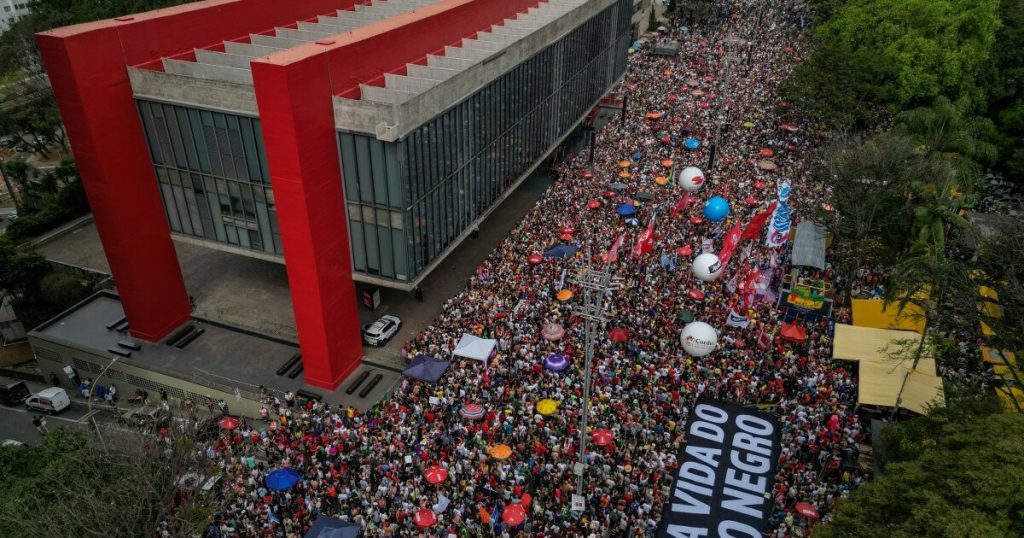The streets of Brazil roared with dissent on Sunday as thousands of citizens protested against perceived legislative overreach by their Congress. The focal points of their ire were two controversial bills: one bolstering lawmakers’ immunity from prosecution and another proposing amnesty for those involved in the January 2023 attacks on government buildings, potentially including former President Jair Bolsonaro. This wave of public anger comes on the heels of Bolsonaro’s conviction and 27-year prison sentence for attempting to stage a coup, further polarizing the nation and intensifying scrutiny of the conservative-dominated Congress. Protestors accused lawmakers of prioritizing self-preservation over pressing social and economic issues, chanting “No amnesty!” in cities across the country. Iconic musicians lent their voices to the movement, with Caetano Veloso, Gilberto Gil, and Chico Buarque slated to perform a protest concert in Rio de Janeiro.
The protests represent a boiling over of public frustration with what many perceive as a blatant attempt by Congress to shield itself from accountability. The so-called “Shielding Bill,” approved by the lower house on Tuesday, mandates a secret ballot among lawmakers before one of their own can be charged or arrested. This move has been widely condemned as creating a culture of impunity within the legislative branch. Adding fuel to the fire, Congress fast-tracked an amnesty bill on Wednesday, targeting those convicted in connection with the January 2023 attacks on government buildings following Bolsonaro’s electoral defeat. This bill has ignited further outrage due to the possibility of Bolsonaro, a central figure in the events leading up to the attacks, being among those pardoned. The timing of these legislative maneuvers, so soon after Bolsonaro’s conviction, has only served to amplify public suspicion and anger.
The protests unfolded against a backdrop of simmering political tensions in Brazil. Bolsonaro’s trial and subsequent conviction have deepened existing divisions within the country, with his supporters continuing to claim his innocence and denounce the legal proceedings. The Congressional moves to enhance lawmakers’ immunity and grant amnesty have been interpreted by many as an attempt to protect Bolsonaro and other allies from legal consequences. This perception has further fueled public distrust in the legislative body and contributed to the widespread protests. The demonstrations underscore the fragility of Brazil’s democratic institutions and the deep-seated concerns about the potential erosion of accountability among elected officials.
While proponents of the “Shielding Bill” argue it is a necessary measure to protect lawmakers from judicial overreach, critics see it as a cynical ploy to avoid accountability. This bill has become a lightning rod for public anger, symbolizing the perceived disconnect between the political elite and the concerns of ordinary citizens. The controversy surrounding the bill highlights the ongoing struggle to balance the need for legislative independence with the imperative to hold elected officials accountable for their actions. The amnesty bill, meanwhile, has sparked fierce debate about the appropriate response to the January 2023 attacks. While some argue for leniency and reconciliation, others insist that those responsible must be held accountable to uphold the rule of law.
The public outcry against these legislative initiatives has resonated across various segments of Brazilian society. Celebrities, artists, and influential figures have joined the chorus of condemnation, using their platforms to amplify the message of protest. Musician Caetano Veloso, for instance, declared that the Congressional moves “cannot go unanswered by the Brazilian people.” Funk star Anitta used a stark analogy to convey the gravity of the situation, asking fans to imagine being a victim of a violent crime only to have the perpetrator shielded from prosecution by their colleagues. These expressions of dissent from prominent figures have further galvanized public opinion and added momentum to the protest movement.
The fate of these controversial bills remains uncertain. While they have cleared the lower house, they still face significant hurdles in the Senate. President Luiz Inácio Lula da Silva has vowed to veto the amnesty bill, signaling his opposition to what many perceive as an attempt to rewrite history and absolve those responsible for the January attacks. Lula has also criticized the “Shielding Bill,” stating it is not a priority issue for lawmakers to address. The strong public opposition, combined with the President’s stance, suggests a difficult path ahead for both bills. The ongoing protests highlight the deep divisions within Brazilian society and the challenges facing the country’s democratic institutions as it grapples with the legacy of the Bolsonaro era and navigates a path towards healing and reconciliation.


